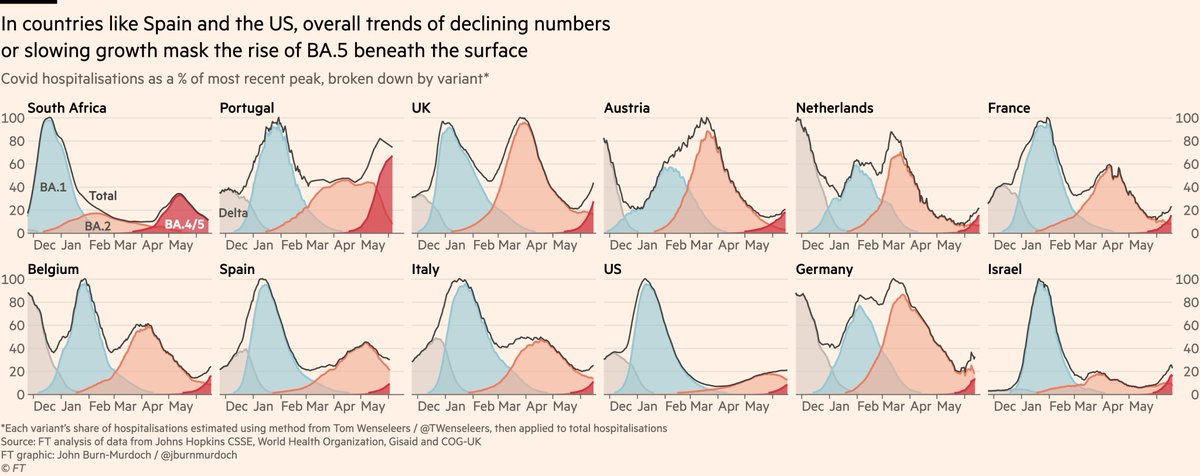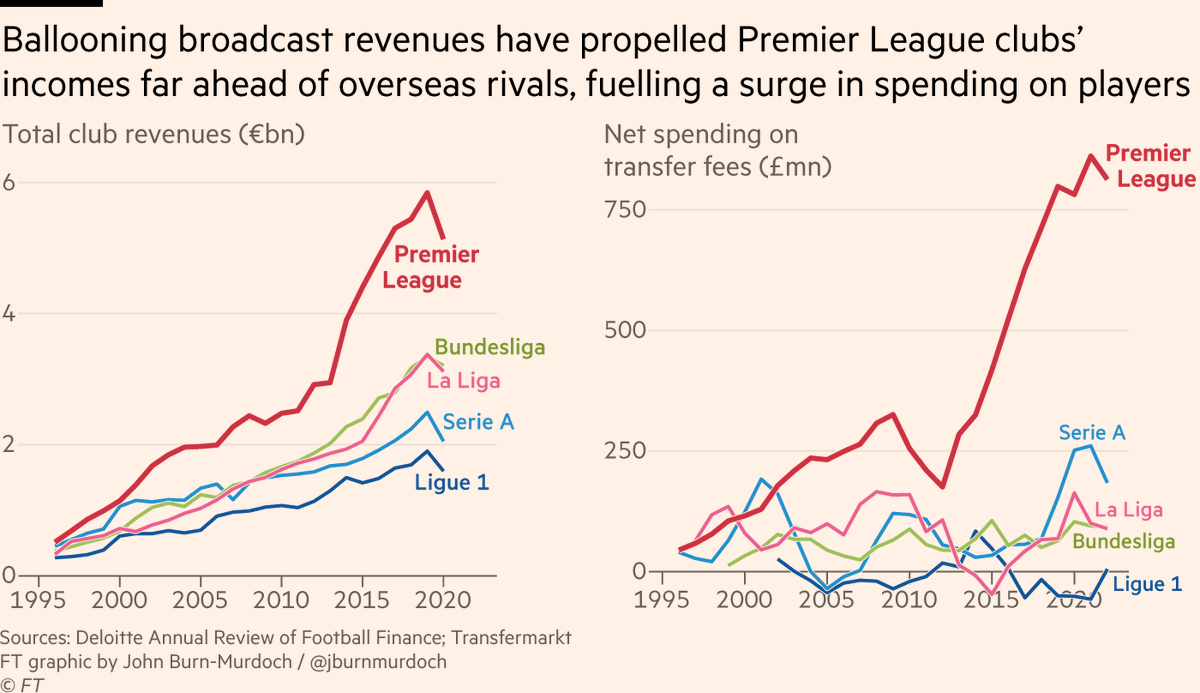
NEW: unfortunately it’s time for another international Covid update, as the BA.5 Omicron lineage (and BA.4 to a lesser extent) sends not only cases but also hospitalisations climbing around the world, from South Africa, to Portugal, the UK, Israel and now the US 📈 

As ever, it’s instructive to look beneath the surface of the aggregate numbers to see what’s really happening.
What appear to be declining overall numbers in Spain, or a slowing of growth in the US, are actually just the BA.5 rise 📈 being partially masked by the BA.2 decline 📉
What appear to be declining overall numbers in Spain, or a slowing of growth in the US, are actually just the BA.5 rise 📈 being partially masked by the BA.2 decline 📉

When looking at these charts, note that where once upon a time it was *relatively* useful to look at one country further along its wave to see what might happen next in another country, that’s becoming less and less the case, as each country’s immunity profile grows more distinct
As you can see, most countries had larger BA.1 waves than BA.2, but in some they were equally high, and in others BA.2 was the big one.
So exactly how high each country’s BA.5 wave will grow is likely to vary considerably.
So exactly how high each country’s BA.5 wave will grow is likely to vary considerably.

Nonetheless, the fundamentals remain the same, and it’s a tale as old as time:
A new variant emerges with sufficient mutations to evade immunity acquired through either vaccination or prior infection and send transmission soaring again.
I’m sure this won’t be the last.
A new variant emerges with sufficient mutations to evade immunity acquired through either vaccination or prior infection and send transmission soaring again.
I’m sure this won’t be the last.
Digging a little deeper, there is some good news and some less good.
The good — using UK as an example — is that while Omicron has sent infection levels way above past records, rates of hospitalisation and death remain relatively low, due to both vaccination and prior infection.
The good — using UK as an example — is that while Omicron has sent infection levels way above past records, rates of hospitalisation and death remain relatively low, due to both vaccination and prior infection.

The less good news comes in two parts:
First, even "moderate" levels of increased hospital load can have big knock-on effects on the healthcare system, with the ripples felt far from the hospital, and affecting far more people than just Covid patients.
First, even "moderate" levels of increased hospital load can have big knock-on effects on the healthcare system, with the ripples felt far from the hospital, and affecting far more people than just Covid patients.
In April we showed how high hospital bed occupancy leads to delays in emergency departments due to a lack of available beds to admit into, which means ambulances stuck waiting to handover patients, which means delays getting out to someone having a stroke ft.com/content/60b6e0… 



And the second part is perhaps the most significant: even though rates of hospitalisation are significantly reduced, the enormous waves of infections that Omicron’s various lineages have brought, have sent rates of long Covid climbing faster than ever, to record levels. 

As of the start of May (latest data), roughly 3% of UK population said they had ongoing symptoms that could not be explained by another cause, and for two-thirds of them (2% of population), those symptoms mean their daily activities are now either somewhat or severely limited. 

2% and 3% are both small numbers and large numbers at the same time.
They’re small relative to the 80-90% of the population who had had Covid by that point, suggesting around 1-in-25 of those has long Covid today, and for 1-in-40 it is limiting their daily activities...
They’re small relative to the 80-90% of the population who had had Covid by that point, suggesting around 1-in-25 of those has long Covid today, and for 1-in-40 it is limiting their daily activities...
...but they’re large in that this means 2% of the UK population — more than 1mn people — now have difficulty with their life, their work etc due to long Covid.
I dunno about you, but as someone obsessed in equal parts with my job and with exercise, this would be life-shattering.
I dunno about you, but as someone obsessed in equal parts with my job and with exercise, this would be life-shattering.
Considered alongside other stats — take the unemployment rate at 3.8% — 2% is a huge number.
The kind of number that can have a huge impact on the number of people who are able to work, or on the number of additional people needing healthcare from an already stretched system.
The kind of number that can have a huge impact on the number of people who are able to work, or on the number of additional people needing healthcare from an already stretched system.
To conclude
• BA.5 sending both infections and hospitalisations climbing. It will do this everywhere, just a matter of time
• Rates of severe disease kept low by widespread immunity from vax & infex
• But rates of long Covid continue to climb, with significant societal impacts
• BA.5 sending both infections and hospitalisations climbing. It will do this everywhere, just a matter of time
• Rates of severe disease kept low by widespread immunity from vax & infex
• But rates of long Covid continue to climb, with significant societal impacts
Final bits and pieces:
The @ONS infection survey remains an utterly invaluable resource for tracking true level of infections as testing rates decline, and for tracking long Covid.
Scaling it back and losing that utility would be a catastrophic error ft.com/content/825af0…
The @ONS infection survey remains an utterly invaluable resource for tracking true level of infections as testing rates decline, and for tracking long Covid.
Scaling it back and losing that utility would be a catastrophic error ft.com/content/825af0…
The equally invaluable @UKHSA have an excellent briefing out looking at all the latest UK data on BA.5 and other notable Omicron lineages, including estimates of their transmissibility advantage over the original strain assets.publishing.service.gov.uk/government/upl…
• • •
Missing some Tweet in this thread? You can try to
force a refresh






